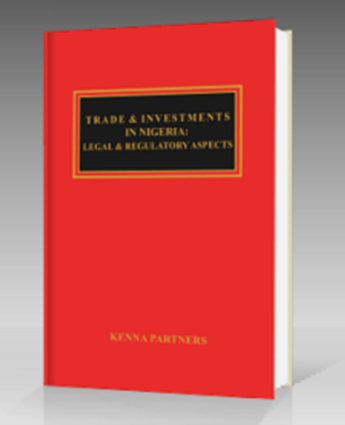I am pleased to be invited to write a foreword to this insightful piece written by the law firm of Kenna Partners. Having been at helm of the Ministry of Industry, Trade and Investment (MITI) for the past four years, I understand the challenges of many foreign and local investors who have either invested in Nigeria or are intending to invest in Nigeria.
Over the years, Nigeria has put in place several incentives for local and foreign investors. We realize that there is a need to always clarify the legal requirements to enjoy these incentives, so as to further encourage investments. Nigeria is among the top ten fastest growing economies in the world and the underpinning objective that runs through the pages of this work, I believe, is the consolidation of Nigeria’s position as a nation and indeed the surpassing our previous achievements.
This is more so in view of the fact that the world has become a global community. One of the challenges of this obvious reality is that there is a paradigm shift from the traditional approach to commerce as we used to know. Global commerce, as amplified by information technology leaves no one in doubt of the need for a rich guide-book of this nature in Nigeria. The need to position Africa as a business-friendly continent so as to maximize the benefits of Foreign Direct Investments (FDI) is a collective responsibility. This book, Trade & Investments In Nigeria: Legal & Regulatory Aspects, provides an insight into many legal and regulatory issues in business such as legislative requirements for doing business in Nigeria, tax management and efficiency, immigration, labour relations, banking and financial services, corporate governance, oil and gas, maritime and incentives for doing business in Nigeria. The reader is provided with an insight into the regulatory issues which a prospective investor must take into cognizance before embarking upon a commercial venture.
This work which covers many areas of the technical aspect of business law has been written in a logical manner, using simple language, thus making it easily understandable even for non-legal minds. It has outlined solutions to the many challenges associated with legal and regulatory frameworks in the field of commerce and investing in the Nigerian economy.
It is in the light of the above that the importance of this piece written by Kenna Partners cannot be overstated. Kenna Partners, as one of the long standing and top-ranking commercial law firms in Nigeria, has brought its wide experience to bear on this book. The Book speaks eloquently of the sheer breadth of the informed understanding of Nigeria’s business terrain by the authors. It is filled with proactive and reliable legal reference materials in the field of commerce. I salute the industry and ingenuity of Kenna Partners in giving us this master piece.
I sincerely recommend this book to captains of industry, business executives, intending foreign and local investors, members of the Bar and Bench, all persons in the corporate world and indeed, the general public. It is a “must read”.
Olusegun Olutoyin Aganga
Minister of Industry, Trade and Investment,
Federal Republic of Nigeria
May, 2015


